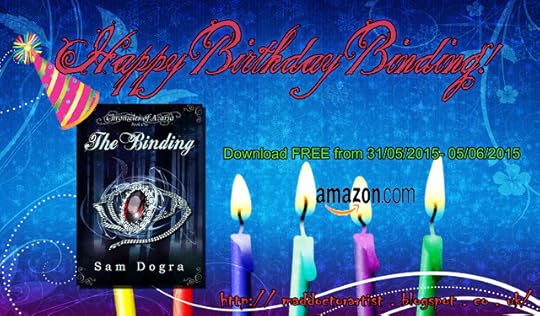Sam Dogra's Blog, page 7
January 18, 2018
The Slow Wax and Wane of Inspiration
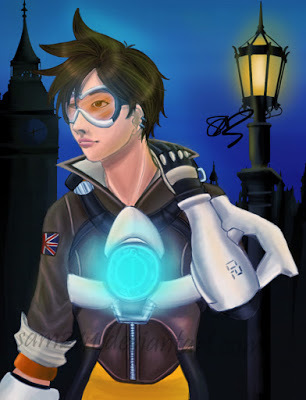
So, as you might have noticed, there's not been much activity on my blog lately, and not all of that is because of work/ life commitments. See, while I've been trying my active best to keep writing and drawing, something's...been missing lately. And since I've thought about the whys and wherefores, I came to a rather interesting conclusion (for me, anyway). Note that this is just my personal opinion, but it seems worth sharing.
During my medical school years, I took a year out in between studies to take a masters degree in Medical Humanities. Part of this included topics usually confined to English Literature degrees, but one of them was Gender Studies. Now, before you all raise the SJW roasting pitchforks, no, this isn't a feminist radicalisation module, it just looks at literary works and applies a feminist lens to them as a form of critique. This really opened my eyes to media trends across the ages, the very limited roles of females represented and how it's really only been relatively recently that this has started to change.
That module provided me with a useful grip on analysis, not just in media but even in trends in my own profession of medicine, and it is truly amazing how widespread old, constricting traditions are (I'm still asked when patients see me if I'm a nurse, for example). But, sticking to media, it's also really limited the things I want to watch/ play/ read about, which has had a knock-on effect on my own creativity.
I've been a fan of many things, including various anime, games and books. These have not only provided great entertainment, but also fed my own creativity, inspiring my own stories and artwork. But as I've grown older, with this new lens to view the media I enjoy, I notice that more recent things just doesn't grab me like the older ones do. I haven't watched a film in cinema for years now, because every film just comes across as the same tired and boring story filled with character archetypes (bar a few exceptions here and there).
The majority of anime has simply degraded into pure fanservice, and it becomes so distracting and off-putting it breaks my suspension of disbelief in the story and characters. They also don't seem to want to move off the 'teenage boy chosen one' trope, which has really lost its appeal since rarely is it ever done in an interesting way. Many new Japanese RPGs, which used to be a staple love for me, have sadly followed the same path, and they don't really try to break out of their tropes and have thus become rather stale.
Now there are exceptions in all those genres, as there would always be, but when they are so outnumbered by the others, they become very hard to find, and the effort to find something then doesn't seem worth the dearth that it uncovers. But this then starts a vicious cycle, in that, for me at least, creativity stagnates when it's not being fed by new or engaging ideas. Thus the time I want to use to write or draw also becomes less fruitful, as nothing truly inspires like it used to.
And it's odd in a way, because, looking back, the things I did enjoy had their fair share of these flaws too, and yet they never seemed as overt. Could well be the nostalgia goggles talking, but I never remembered having fanservice shoved in my face constantly in Final Fantasy 8, or it being so distracting as to break me out of the story of Sorcerous Stabber Orphen, and I was overjoyed with Final Fantasy 12's take on a story that didn't have you playing as the Chosen One.
And I'm not saying such things have to be stripped out entirely- I just wish they didn't consume the majority of media right now, that there was more variety and less reliance on doing the same things over and over and over. It does seem to very slowly be trickling through, and one game in particular I hope is a sign of better things to come.
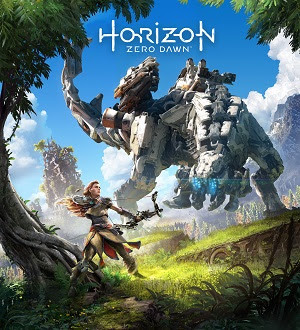
That game is Horizon Zero Dawn, for the PS4. I'd heard lots of positive reviews for the game when it came out and was eager to play. And, for all the criticisms that 'it did nothing new', its story was absolutely incredible, and far, far above most competitors on offer. It's not perfect, of course, but it's such a welcome breath of fresh air. I was deeply impressed with its robust and water-tight plot, its immense scope, a likeable female protagonist who wasn't overly sexualised for the sake of it, a diverse and interesting cast of side characters that all added to the world, yet the best thing was its sense of mystery. Uncovering one answers added extra questions, and the game manages to keep this up right til the very end. It really had me gripped in a way that no game has for a long time, and had me playing continuously until I reached the end.
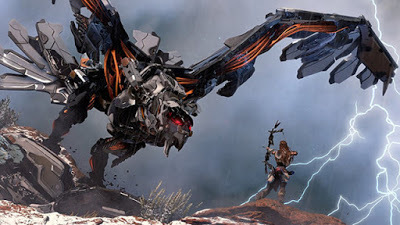
So, perhaps my tastes have just become super-picky now, and I need to ease back. Or perhaps I just need to look harder, get better at finding media to my taste. But either way, it's been a useful reflection, as now I can try and tackle my issue of not imagining as freely as I once did, and hopefully return to feeling refreshed and inspired like I once did.
Published on January 18, 2018 05:38
April 30, 2017
Rising from the dead!
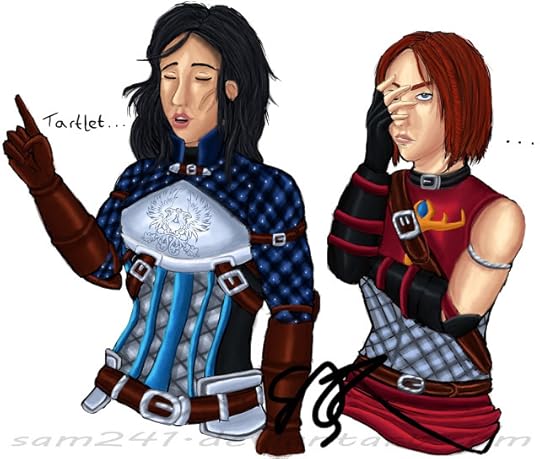
Hi all! I have neglected this poor blog as of late, but I've been busy.
I have had a little break from writing my main novel series, and have instead been writing fanfiction and focusing on my art.
So, if you wanted to catch up:
I've made a character sheet for my Dragon Age protagonists.
I've also updated my fanfic page with my new stories!
And you can check my deviantart account for my drawings.
I hope to return to the Chronicles of Azaria soon, hopefully before the end of the year, so stay tuned!
Published on April 30, 2017 09:10
March 27, 2016
Am I missing something? (Part 1)

So, as you may have gathered from previous posts, I love good stories. However, that then begs the question; what, to me, makes a good story? In previous posts I've touched upon well written characters, so this time I want to compare stories with similar themes and/or premises. The catch here is I'm going to pick one story I liked, and one I disliked, and try to explore the reasons why one worked for me and the other didn't, despite their similarities.
Once again I'm going to look at different media, including books, video games, and film. First I'll focus on books (Part 1 and 2), then video games (Part 3 and 4), and finally film (Part 5).
To outline what's to come:
Part 1: Lord of the Rings vs. The Books of Pellinor
Part 2: Percy Jackson vs. Harry Potter
Part 3: Tomb Radier vs. Uncharted
Part 4: Bayonetta vs. Devil May Cry
Part 5: Wall-E vs. The Lorax
Disclaimer: These are just my personal opinions, and I'm sure the flaws in my arguments will be pointed out and thrown in my face, however just because *I* think something is not very good, that doesn't mean others have to agree. If you like something I don't, wonderful! Variety is the spice of life, after all.
THE LORD OF THE RINGS VS. THE BOOKS OF PELLINOR
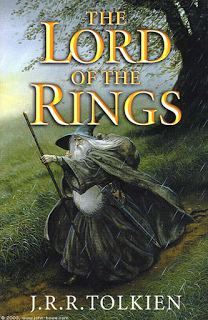 VS.
VS.
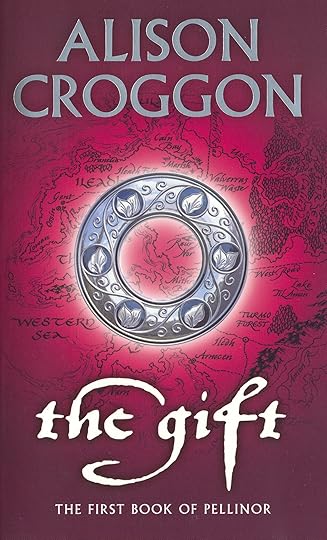
A controversial one to start with, especially as the latter was actually inspired by the former! But this is a question that always intrigued me. As a writer of fantasy myself, why have I never gotten along with the founding father of the genre? It's not like I'm anti-Tolkein either; I enjoyed the Hobbit (just don't speak about the film(s) in my presence). But these books I just couldn't get into, and for various reasons...
PESSIMISTIC VIEWS OF MANKIND
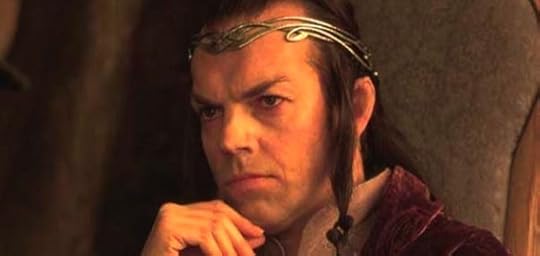
This is something that I have a very strong opinion about. Yes, Tolkein lived through World War 2 which left a huge impact on him (and art in general), but his generalized denigration of the human race has persisted so deep that I've become completely sick of it. Sci-fi is very guilty of this as well. From elves of the deep woods to far-flung aliens in the darkest reaches of space, of course they must be better than us mere humans! And not only from a technological standpoint (which I could deal with), but from a moral standpoint.
As a doctor I've seen the nasty things people are capable of, but I've also seen the wonders people can achieve as well. We can be very resourceful and skilled when backed into corners. Hence, I didn't like how 'men' are portrayed as weak, inferior to the other races, and needing 'guidance'. Perhaps it's just my belief that we have more control over our own situation that we sometimes believe, and the tension between having an internal or external locus of control (which is something Tolkein explores; I just don't agree with his eventual outcome).
On the other hand, Croggon's take on the subject is a lot more morally grey. People are capable of good and bad things, and both are not mutually exclusive, either. Even the 'good' characters make questionable choices, and good people can be pushed into doing terrible things (her third book, The Crow, is a particularly dark example of this).
However, she doesn't need to split her world into races to show this, and rather shows problems with diversity within a race (Saliman's black skin, for example, and Maerad's gender). Croggon's portrayal is much more sympathetic, and for me, hits closer to home. It's much more horrifying to see a normal person brainwashed into doing something unspeakable, rather than just 'because they were evil'.
STAGNANCY

I will admit this is a slightly cheap shot, as it's probably more an effect of what came after LOTR as so many tried to 'copy' the master style. I'm sure if I'd read LOTR when it came out I'd not have this particular qualm against it.
Nevertheless...
The medieval fantasy setting has become something of a rut. Forget the progress of technology, let's have random magic and leave it at that! Who needs working pluming, or proper irrigation, or complex architecture (though Sauron got his money's worth with that tower...)
It's something barely ever commented upon, and for me, it makes the setting stagnant. It gives the impression that a) society exists in a vacuum and is never pressured to adapt to surroundings and b) there is never any impetus for change. I appreciate the story is not supposed to be a treatise on how the characters worked to increase agriculture yields, and the spread of Sauron's army would've put a damper on progress, but it would be nice to see hints of it. Heck, even watching the enemy army develop more powerful technologies would've been good, as war is actually quite a stimulus for technological advancement.
Croggon's books are not that much different in this aspect, but because she's worked in an interesting magic system, it's possible to see magic and technology working in harmony. She takes time to show how normal people live, so we get an idea of how Bards (the magic-capable people in her world) use their powers to make day to day life easier, and further their own technology. Again, while I wouldn't say these books do tonnes better than LOTR, it just seems to bother me less here.
TOKEN FEMALES

So a lot of older media (and let's face it, a lot of newer media too) tend to over-represent males and under-represent females. The main quest with Frodo has all-male Hobbits, a male wizard, a male warrior, a male dwarf, a male elf, etc etc...and while there are female characters, they're not really crucial to the main plot, and are quite outnumbered by their male counterparts. Even when there are dire city sieges, with little to no hope of any victory, none of the women are given any opportunity to fight.
This is usually met with the 'but that's what it was like in those days, women didn't do anything!' excuse, which, as historical research has proven many times, is not true. Women did plenty; they just weren't recognised for it and so were written out. Again, part of this is a result of LOTR being a product of its time, and it's not that the women who do appear have terrible roles. It's just a bit more of them would've been nice. Women played a very large and active role in both World Wars, so it's not like Tolkein was lost for examples.
Croggon of course goes the whole hog and makes the protagonist a girl (but then if you know the author at all, this shouldn't be a surprise). But she doesn't stop there; there's a whole host of female characters who appear both as allies and enemies. This allows for a much better representation of the female spectrum, because (as most of modern YA will attest) having just one female character means you have to shove conflicting traits. She can't be docile, she's an action heroine, but she can't be too masculine so needs feminine appearances, etc etc. And it's not like there's a sparsity of men in exchange; Cadvan plays just as an important role as Maerad, and so does (spoiler: her brother Hem as well).
CONCLUSION
So, it seems I prefer the Books of Pellinor because...they're written with a more modern mindset, I guess? It also doesn't rely on the traditional fantasy races (elves, dwarves, orcs etc, which I just don't like outright no matter how they're written) and uses actual ethnicities instead. And while I can appreciate the enormous impact Tolkein's works had (and still have) on the genre, it's just not for me. Born in the wrong era, I think!
Stay tuned for the next part, where I pit the Percy Jackson series against Harry Potter!
Published on March 27, 2016 12:10
January 10, 2016
Top Media That Influenced Me (Part Two)

Everyone takes inspiration from something, and I'm no exception. It can be interesting to
delve back and see what media have left a lasting impact on me, and so that's exactly what I've done. So, prepare yourself for a blast from the past as I explore the media that have left the biggest impression on me and continue to inspire. This is Part Two- for Part One click here.
Eternal Darkness
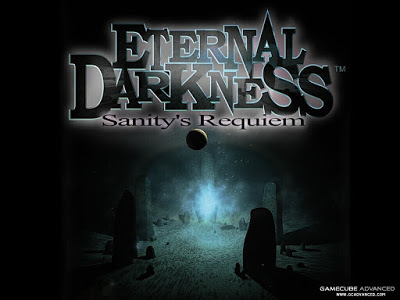
This was the first game I played on the Nintendo Gamecube, and it really opened my eyes to what great storytelling should be about. The game is a time-sprawling horror epic, spanning all of human history, where ancient evil strives to resurrect itself through a corrupted Roman soldier. You experience the story through the eyes of Alexandra Roivas, living in the present time as she reads the Tome of Eternal Darkness, a fiendish book which has recorded 'true history'.
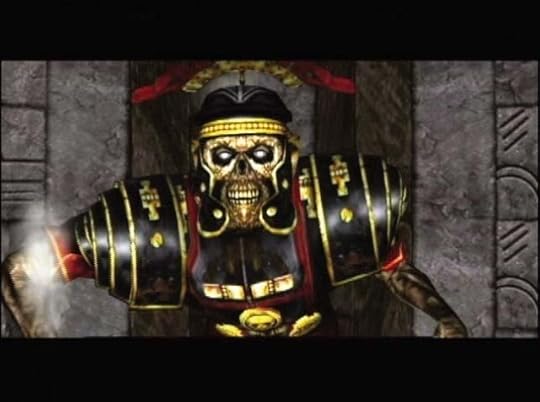
At the time I played this game I was starting to venture into my own original writing, but I was getting quite stuck in terms of scope and premise. I'd read quite a few YA novels and been disappointed in that the stakes and plot never seemed that big. This game however tore through all of that. I loved the whole 'hidden unwritten history' angle, the various historical settings and the brilliant (if not particularly diverse) cast. I'd never been much of a fan for H.P. Lovecraft or horror, but the depth of story and intrigue really gripped me and it's definitely my biggest source of inspiration to date.
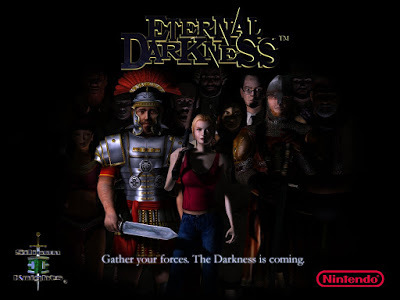
Final Fantasy XII
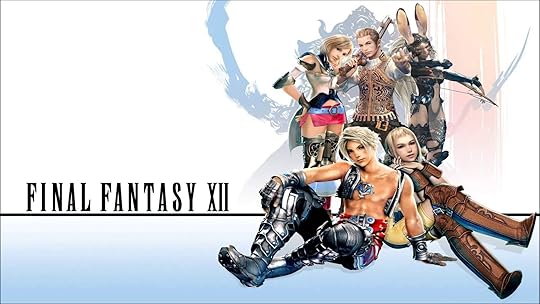
I played this game quite a while after its initial release. I knew pretty much nothing about it, but I had played previous Final Fantasy games (VIII and IX) and enjoyed them, so I thought I'd give it a go. Like most Final Fantasy plots, it's complex and winding, but it touches on a lot of interesting themes. You follow the story through the eyes of Vaan, who is not actually the protagonist but is a bystander who gets dragged along for the ride when he joins the rebellion to free his home town from Empire rule.
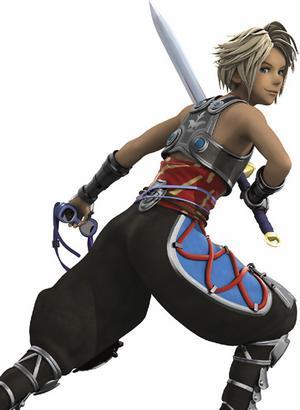
Having a story framed like this, while it did cause some upset to a lot of players, I thought was really intriguing. It felt more engrossing in a way; I as a player was being taken along this epic journey as a viewer rather than a protagonist, so I could pay more attention to what was going on. I enjoyed the themes about fate versus free will, the weight of difficult choices and how small actions can have a bigger impact. Again, I also liked the worldbuilding which was comfortably past stagnant sword 'n sorcery but not right into uber advanced sci-fi. This aspect has again had an influence on my Azaria series in terms of how I envision the technology and landscape, and its deeper theme of being in control of your own destiny has filtered through to my (currently on hold) first novel, The Zodiac Hunters.

Madoka Magica
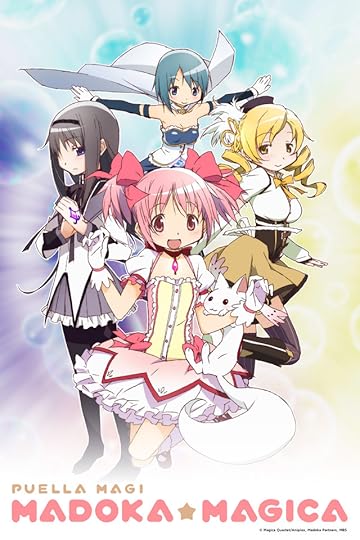
This is a lot more recent an influence than the others, in that I only watched it last year, but it certainly left an impact. Don't let the pretty colours fool you! It's a dark, more tragic take on the traditional magical girl genre, following a girl named Madoka and her friends. They are offered a single wish from a strange being called Kyubey so they can gain powers to defeat evil Witches, but the implications are more far-reaching than they could ever know.
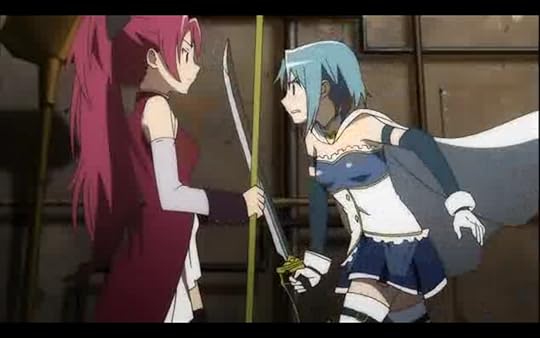
So I'm a big fan of subversions/ deconstruction in media- that is, when a typical story trope or stereotype is twisted around- and while Madoka isn't a true subversion it's still fascinating. It explores and takes a very jaded view of the ideals behind gaining magical/ super powers and how they are used. I enjoyed the characters' perspectives too, and as morbid as it sounds, watching them unravel was really engrossing! Most of the main characters slowly find their idealism crumbling around them, and end up losing faith in that which they most strongly believed in. It inspired some thoughts as to my own characters and how sometimes it can be more interesting to watch negative character development.
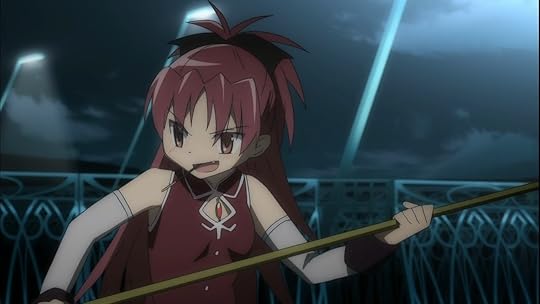
Avatar: The Last Airbender and Legend of Korra
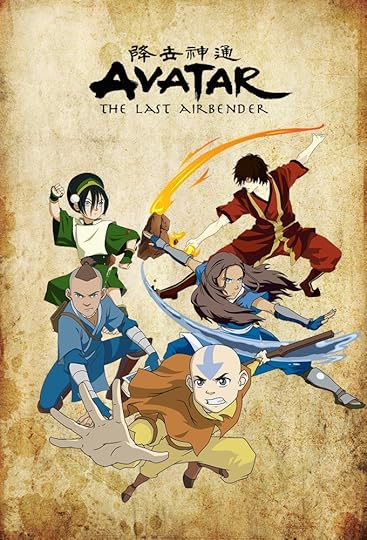

While these are two separate shows, they're of the same continuity so I've lumped them together, as each of them taught me several things. Avatar: The Last Airbender follows the journey of Aang, the last airbender, who must restore peace to the world and take on his role as Avatar, the one who brings the nations together in balance. Legend of Korra follows on from that, as Korra is the Avatar to follow Aang, but her character, personality and journey is very, very different!
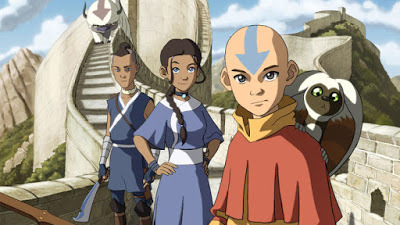
Avatar was another piece of media I didn't watch when it was released, although I'd heard lots of positive things about it. Eventually I got around to watching it, and didn't regret it. I can find pretty much zero fault with this series, at least in terms of story-telling. Everything, from the pacing, the setting, the characters and their development and the balance of comedy with serious moments just fits so well. Granted I never really liked Aang's design (blue arrows, really?), but the series showed me how with careful planning everything can just fall into place.
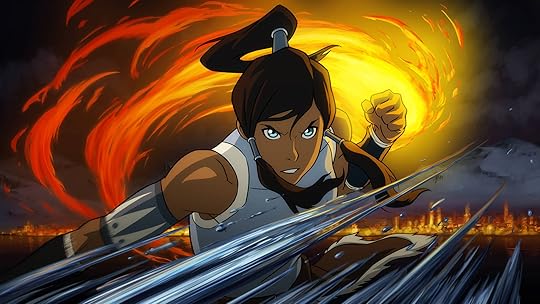
Oddly enough, Korra isn't quite as 'perfect' particularly in terms of pacing (thanks to behind the scenes problems and issues regarding whether the series would continue after the first season), and yet I find this series a lot more interesting. The creators took more risks, not all of which worked, but the darker themes, improved character designs (Korra is much more impressive than Aang ever could be!) and shorter plot arcs were more fascinating to watch. While it does have pacing issues and underdeveloped characters (my biggest gripe is with Asami who was sorely under-used), it still comes off strong and certainly has more to offer than the original series.
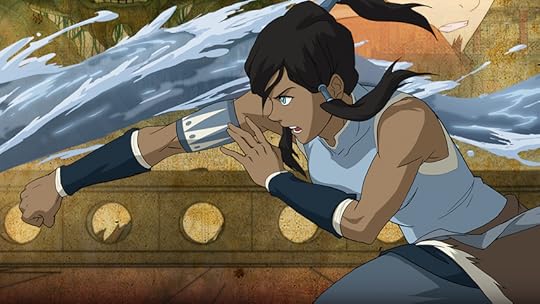
So, while Avatar showed me the importance of good pacing and how smaller stories can tie in with an overall main arc, Korra showed me the importance of strong, flawed characters and how this contributes to much more fascinating character development.
Tales of Symphonia
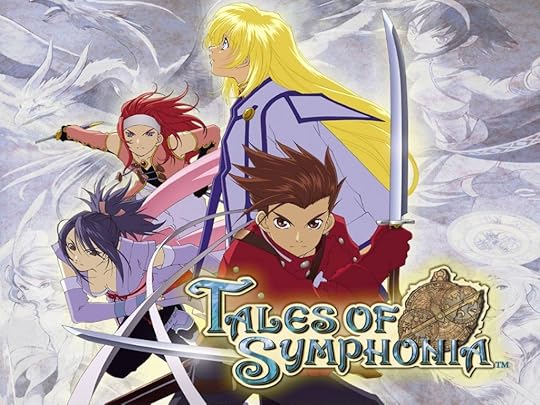
This was the first Tales...game I ever played, and it really blew out the water everything I'd come to expect from Japanese RPGs. This game followed the adventures of a boy named Lloyd, whose best friend Colette, the 'Chosen One', is about to embark on an important journey to restore prosperity to their world, as the life-force of the planet is being drained and abused. Little does he know that he's about to get involved in matters much worse, where he'll discover the truth about the laws that really govern his world.
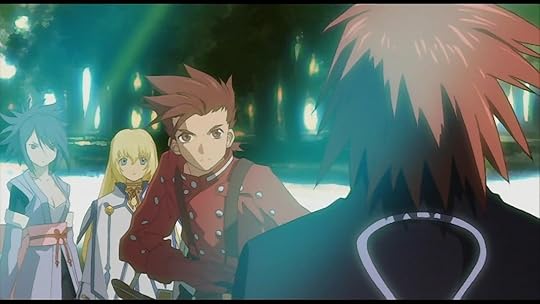
Until this point in terms of RPGs I'd only played Final Fantasy, which tended to be more traditional in its presentation. So when I played this game, which totally deconstructed my most loathed plot archetype (the 'Chosen One'), introduced the concept of fantasy racism, and had many more twists and turns than could be considered reasonable even for a JRPG, it ticked all the boxes for me. The story and setting were amazing, the characters intriguing, and the gameplay wasn't half bad either. This was the first game where I really sympathised with the villain, as his motives were solid, even if his execution of said motives was questionable. It showed me the importance of humanising an antagonist, to make them more real and to provide a better foil to the protagonist. I still think this game's story is just perfect in almost every aspect, and it's given me a yardstick to measure my own plots against!
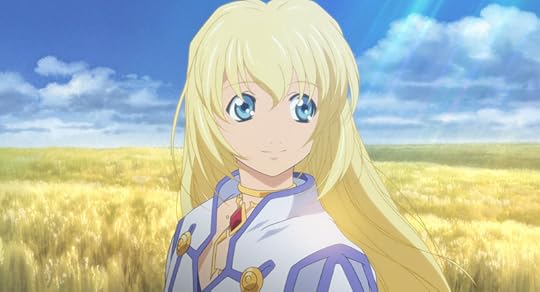
So there you have it. Perhaps surprisingly as a writer I haven't taken a lot of inspiration from books, but it just goes to show that good storytelling can be found in any media.
What other media have inspired you? I'd love to know!
Published on January 10, 2016 10:20
January 3, 2016
Top Media That Influenced Me (Part One)

Everyone takes inspiration from something, and I'm no exception. It can be interesting to
delve back and see what media have left a lasting impact on me, and so that's exactly what I've done. So, prepare yourself for a blast from the past as I explore the media that have left the biggest impression on me and continue to inspire.
Sonic the Hedgehog

The very first piece of media that I ever became a fan of, and that's going back some years! In case you've been living under a rock for the last 20 years, Sonic is a speedy blue hedgehog, who along with his (now quite extensive) cast of companions goes against the evil Dr. Eggman who wants to take over the world with his ingenious robotic creations.
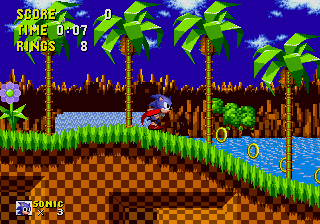
Our family bought a SEGA Mega Drive (Genesis) for Christmas of 1993, and Sonic 1 was packaged with it. Of course, only being 7 years old, I was pretty terrible at it and often cried that I'd never get past the second level, but persistance and practice paid off. I went on to get the other Sonic games and they became a staple. I also enjoyed the cartoons, and those were what led me to joining my first fandom when we got the internet a few years later.

Soon after, I entered the wonderful crazy world of fan fiction, igniting a newfound love for writing. Stuffing every story with fan characters, finding weak reasons to change personalities, but not quite stooping to the level of Mary Sue, I still have them and I get a good laugh reading through the silly plots. 'Trying too hard' is putting it mildly!
I'm not really a part of the Sonic fandom now (I found other things more interesting as time want on), but I still enjoy (most) of the newer games and I'm always interested in what new antics the blue hedgehog gets up to these days.
Teknoman

This was the first anime I ever watched, way back when I was an impressionable teenager. I watched the dub on Fox Kids, and it became the second fandom I ever joined online. Basically, the Earth is under attack from an unknown mysterious alien race, who have super powerful mecha generals leading the assault. However, one of them, only known as Blade, goes renegade and fights on behalf of the Earth. He joins a group called the Space Knights, and the anime follows their role in the war and uncovering Blade's mysterious past.
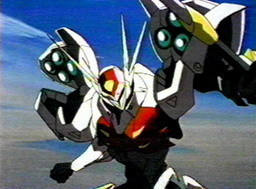
Looking back, I do wonder what captivated me about the series, since it's a sci-fi mecha anime, which I wouldn't usually touch with a ten-foot barge pole. I guess the characters stuck with me. Blade is your typical broody stoic male lead with tragic backstory, and the Space Knights have their own little quirks (names after the '/' are the Japanese names, back when anime dubs took a lot of liberties with the source material): Ringo/ Noel the cocky pilot, Tina/ Milly the computer wiz, Mac/ Honda the Scottish mechanic and his partner Maggie/ Levin [yes he/she underwent a gender change] the crack engineer, Star/ Aki the aptly named navigator, and their fearless Commander Jamison /Freeman.
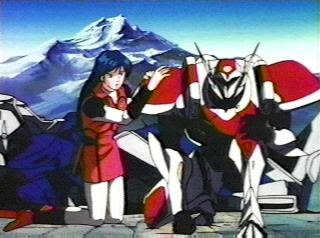
I have to say it's really lost its appeal over the years and it has dated fairly badly (those damned stereotypical gender roles and all that), but at the time it sparked off more fanfiction and also fanart. While it seems embarrassing now, I can't deny the role it had in shaping my writing!
Shinzo/ Mushrambo
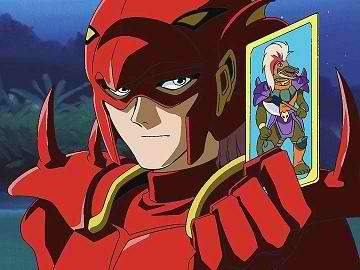
A quaint little anime I watched on TV, not longer after Teknoman in fact. It was the next
fandom I jumped into. The show follows the journey of a girl named Yakumo, who is put into suspended animation by her father during a war with humans and their own genetically engineered creatures called Enterrans. She awakens 500 years into the future, and accompanied by the hot-headed Enterran Mushra, the more subdued Saago and the money-minded cat Kutall, makes her journey to Shinzo, where she can hopefully restore peace between humans and Enterrans.
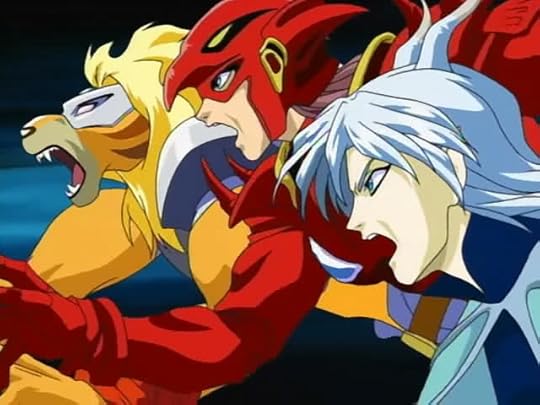
I enjoyed this show, with its unique character designs and fun characters. I even borrowed the name of one of its antagonists for my Chronicles of Azaria series (granted it is a cool name). It also inspired more fanfiction and fanart (big surprise?), and was perhaps the last fandom I was fairly active in.
Sorceror Stabber Orphen
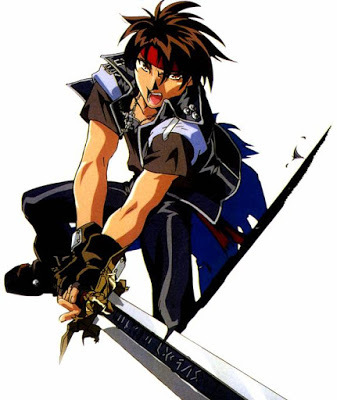
This was the first 'authentic' anime I saw (i.e. I bought the original on DVD and watched it that way, rather than as a mangled dub on TV). I was first introduced to it via image searches on the internet, and I was obsessed with this bandana-wearing, leather-clad sorceror who seemed to have a bit of a fetish for this incredibly detailed demonic sword. The story follows Orphen, a sorceror on the run as he tracks down the dangerous dragon Bloody August. He gains some companions along the way and we learn about his involvement with the dragon and his true goal.
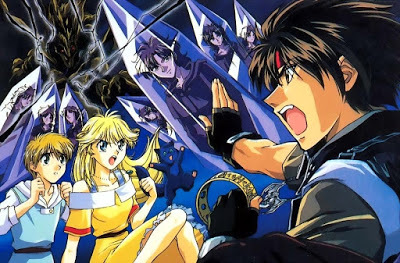
So it was Orphen's design that grabbed me most. My initial designs of my first original character borrowed quite heavily from him, in fact. The anime itself I enjoyed immensely; the worldbuilding and setting was great, the story was intriguing and the characters were fun. Orphen was yet another broody hero (but not so stoic and with a more dry sense of humour), Majic his bumbling apprentice, and Cleo the fiesty noblewoman/ occasional swordsman. The show also balanced its comedic moments with the more serious ones, giving it a strong overall tone.
[image error]
I haven't watched it in a while but I will definitely make time to do so, as it still holds its intrigue and I still like the aesthetic appeal. While it didn't inspire me to join its fandom, it did get my brain ticking over how I wanted my own original ideas to be presented, so it's definitely had a huge impact.
Romeo x Juliet
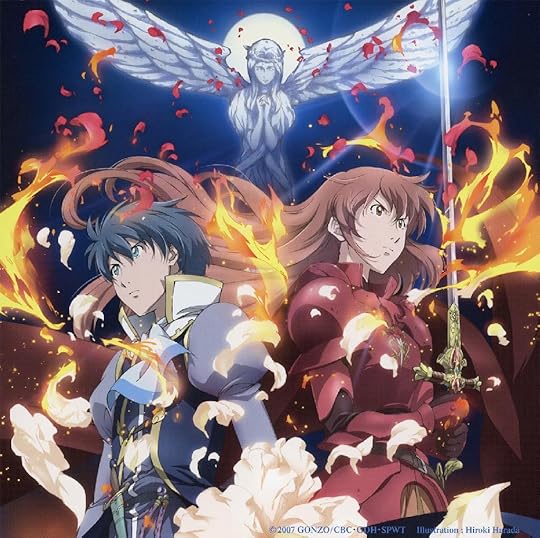
I came to be introduced to this quite a bit later than the above three. Similar to Orphen, I was drawn to the beautiful art-style when I was looking for new anime to watch. I was never much a fan of Shakespeare's original play, but the thought of a fantasy style setting with Juliet playing the lead made me sit up. And I was not disappointed!
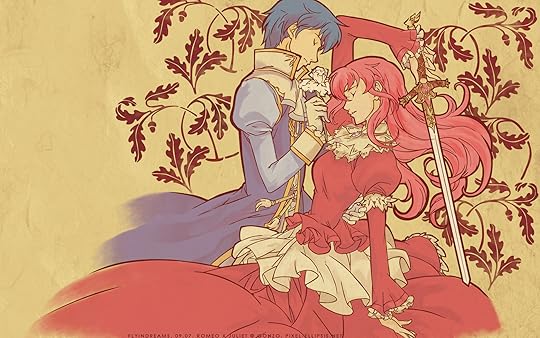
The story is basically a retelling of the classic, but as said, it's with Juliet as the protagonist and Romeo as HER love interest. She has had to hide from her true heritage due to the brutal murder of her entire family when she was a child. When Juliet comes of age, however, the truth is revealed, and loyalists to her family push her to lead them against the vicious Prince Montague who staged the slaughter of the Capulets all those years ago to seize power.
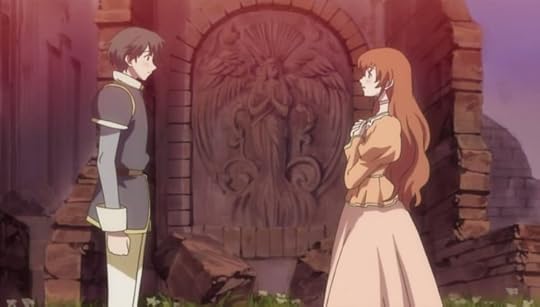
The presentation of this anime is simple breath-taking, and it lent a lot for the worldbuilding of my Chronicles of Azaria series. I also liked the characters a lot, who were given much more personality and flaws, and it was refreshing to see a love story with a female lead who actually had an important role in the main plot. It helped me realise the importance of having strong characters, which make their relationships with each other more real.
Find out about the other media that influenced me in Part 2...
Published on January 03, 2016 11:07
November 1, 2015
New fanfic!
I haven't been around much lately (those pesky medical exams etc), but I have been quietly writing in the background. So please allow to present a new addition to my fanfic page, where I delve into the world of Dragon Age: Origins.
Choices
Elissa Cousland knows the difficulty of the choices she’s made during her journey, but what happens when she can’t face her mistakes? Takes place during the Arl of Redcliffe/ Urn of Sacred Ashes quests.
Click here to check it out!
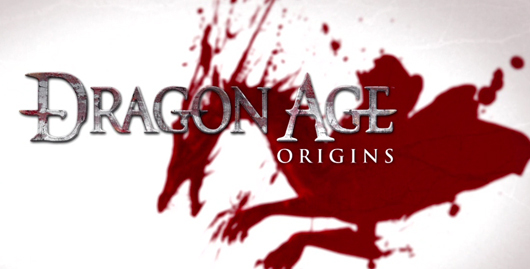
READ THE FIRST CHAPTER BELOW
The chill air of the Frostback Mountains was a welcome change after so long shut in Orzammar, and I took a breath to savour it. Not that it could cleanse the guilt that haunted me. I tried to focus on the snow-capped horizon, but my thoughts wouldn’t still. Once again I’d been thrown into a conflict not of my making, forced to pick sides I scarcely understood. And once again I was left with lingering doubts as to whether I’d made the right choice.
My eyes narrowed. Choice. How I’d come to loathe that word. It was ironic; I’d longed for choice when Duncan had dragged me from Highever, desperate to go back for Father and Mother. I’d longed for the choice to fight Howe, instead of being forced to become a Grey Warden. And there were times I still longed to choose to walk away from it all.
Yet now I’d gone from one extreme to the other. For with both the Circle and the Dwarves, I’d had to pick one path and forego another. Templars or mages; the castes or casteless; Harrowmont or Bhelan. Too busy bickering amongst themselves, I’d had to bring order to their chaos. To remind them that as they screamed and yelled and stamped their feet, the Blight swept the lands, ready to engulf Ferelden in darkness. And I was getting sick of…
“Hello, Ferelden to Elissa, is anyone home?”
I blinked, snapping my head up. Alastair was waiting before the mountain path, along with the others. He raised a concerned brow.
“Sorry.” I discarded my train of thought. “What is it?”
“We don’t mean to be too much trouble,” Morrigan drawled, folding her arms, “but we would like to know your intent, Warden. You have yet to declare our next destination.”
My face flushed. Guess I’d been too deep in thought to notice.
“Well, we can either try and track the Dalish elves, or go to Redcliffe,” I said, regaining composure. “Any preferences?”
“Redcliffe is nearer,” Alastair piped up, “and easier to find than the Dalish camp. We could be combing the Brecilian Forest for weeks otherwise.”
“I too would prefer a more comfortable exercise,” Zevran added, resting his hands behind his head.
“How unsurprising you’d wish for the simpler route,” Morrigan scoffed. “I recommend we seek the elves. T’would be a more fruitful venture. For one, we would gain eyes to check the Blight’s progress.”
“But if Arl Eamon is as ill as the rumours say, should we not go to confirm this?” Leliana asked. “If we are too late…”
“Then it will be futile to try and gain the approval of the Redcliffe army,” Morrigan retorted. “No doubt Loghain’s influence has taken hold there, and if the Arl cannot counter it, what chance do we have? His men will more than likely attack us on sight. But if we had the backing of another army, they would have to think twice before crossing us.”
“Who cares,” bellowed Oghren, taking a swig from his flask. “So long as there’s ale around I’m game for anything!”
“Indeed,” Wynne said quietly. Sten frowned, but remained silent. “The choice is up to you, Elissa.”
I clenched my teeth. Of course, it was always down to me.
“We’ll go to Redcliffe,” I said at last. Morrigan’s eyes flashed, but I ignored her. “The Dalish aren’t exactly on friendly terms with us, either. I’ll take my chances with the Arl’s soldiers.”
“Good. Seems some of us still have sense,” Alastair puffed out his chest. Morrigan rolled her eyes.
“Then let’s make a start while it’s still light,” Wynne said.
Alastair strode ahead, shooting Morrigan a triumphant glare. Morrigan gripped her staff tighter, her lip curled. I shook my head. Yet another tightrope I had to walk delicately. It was a wonder they hadn’t torn each other’s throats out. But despite Morrigan’s constant disdain, she had never betrayed my orders, so I could afford to ruffle her feathers now and then.
Besides, I had good reason to choose Redcliffe. Eamon’s knights, as far as Alastair had told me, were loyal and steadfast, and would not simply cow to Loghain’s rumour mongering. Nonetheless, many would be searching for the Sacred Ashes, so I had no idea how many remained around the village. I could only pray they would be willing to listen to a Warden.
“Something on your mind?”
I glanced to my left. Leliana was walking alongside me.
“You’ve been very quiet since we escaped the Deep Roads,” she said.
“You know I’m not one for many words,” I answered. Leliana smiled.
“Ah, but even for you this is a stretch,” she teased. “Besides, you always hold that furrowed look whenever you are troubled.” The heat returned to my cheeks. She always watched me so closely. “Has something upset you?”
I sighed. “It’s nothing I can change.”
“Maybe so, but dwelling on such things will not do you much good,” Leliana said. Her tone darkened. “I should know.”
“Look, it’s nothing, really,” I said. “I…I just get frustrated sometimes, that’s all.”
“With those two?” Leliana nodded towards Alastair and Morrigan, who continued to sling insults. “You wouldn’t be alone there.”
“No, that’s not what I meant.”
“So what do you mean?”
I hesitated. Part of me wanted to reveal the truth, yet my wariness held me in check. It felt wrong to share my doubts so openly. But Leliana always had a patient ear, and I’d come to appreciate her counsel. Perhaps it would do no harm.
“I was never meant for this,” I said softly, in case the others overheard. “I was the younger Cousland, and a woman. Never meant to take over the family name, or the responsibility of Highever. I was never supposed to…to become a leader, to have others look to me for guidance. I just…” I shook my head. “I don’t know if what I’m doing is right.”
Leliana’s gaze softened.
“It is only natural to feel that way, especially given the burden placed on you,” she said at last. “But everything you’ve done so far has worked out. You restored the Circle and defeated the abominations, you destroyed the Anvil so it would take no more innocent lives, and appointed a ruler to the Dwarves. Where there was unrest, you brought stability, and you did not abuse your power to achieve such.” She touched my shoulder. “You’re a good person, Elissa, and it shows in the decisions you take.”
I nodded slowly.
“It’s one of the many reasons I admire you,” Leliana went on. “You are not afraid to stand for your convictions. I have seen many falter at much less.”
“You give me too much credit,” I replied.
“Of course,” Leliana smirked. “After all, you chose to bring me along, didn’t you?”
“I have yet to see how that proves me a wise decision-maker…hey!”I barely finished my sentence before having to quickly side-step. The bard was still on target, and her elbow grazed my side. My foot slipped in the ice, and we almost thumped into a nearby tree.
“What in the Maker’s name are you two doing back there?” Wynne snapped. She shook her head. “I would expect this kind of behaviour from Alastair or Zevran, but not you, Warden.”
I cleared my throat, straightening my sword sheathes. She reminded me so much of Mother when she took that tone.
“My apologies, Wynne,” I said. “You are right, we should not tarry. Redcliffe won’t come to us any sooner.”
Wynne nodded, turning back to the road. Leliana giggled softly.
“I will repay you later, dear Sister,” I said, unable to stop my grin. “Do not think the Maker will save you.”
“I will accept any punishment, Warden,” Leliana conceded. “Anything is worth seeing your smile returned.”
The burning returned to my cheeks, and it had nothing to do with the cold.
Click here to read on...
Choices
Elissa Cousland knows the difficulty of the choices she’s made during her journey, but what happens when she can’t face her mistakes? Takes place during the Arl of Redcliffe/ Urn of Sacred Ashes quests.
Click here to check it out!

READ THE FIRST CHAPTER BELOW
The chill air of the Frostback Mountains was a welcome change after so long shut in Orzammar, and I took a breath to savour it. Not that it could cleanse the guilt that haunted me. I tried to focus on the snow-capped horizon, but my thoughts wouldn’t still. Once again I’d been thrown into a conflict not of my making, forced to pick sides I scarcely understood. And once again I was left with lingering doubts as to whether I’d made the right choice.
My eyes narrowed. Choice. How I’d come to loathe that word. It was ironic; I’d longed for choice when Duncan had dragged me from Highever, desperate to go back for Father and Mother. I’d longed for the choice to fight Howe, instead of being forced to become a Grey Warden. And there were times I still longed to choose to walk away from it all.
Yet now I’d gone from one extreme to the other. For with both the Circle and the Dwarves, I’d had to pick one path and forego another. Templars or mages; the castes or casteless; Harrowmont or Bhelan. Too busy bickering amongst themselves, I’d had to bring order to their chaos. To remind them that as they screamed and yelled and stamped their feet, the Blight swept the lands, ready to engulf Ferelden in darkness. And I was getting sick of…
“Hello, Ferelden to Elissa, is anyone home?”
I blinked, snapping my head up. Alastair was waiting before the mountain path, along with the others. He raised a concerned brow.
“Sorry.” I discarded my train of thought. “What is it?”
“We don’t mean to be too much trouble,” Morrigan drawled, folding her arms, “but we would like to know your intent, Warden. You have yet to declare our next destination.”
My face flushed. Guess I’d been too deep in thought to notice.
“Well, we can either try and track the Dalish elves, or go to Redcliffe,” I said, regaining composure. “Any preferences?”
“Redcliffe is nearer,” Alastair piped up, “and easier to find than the Dalish camp. We could be combing the Brecilian Forest for weeks otherwise.”
“I too would prefer a more comfortable exercise,” Zevran added, resting his hands behind his head.
“How unsurprising you’d wish for the simpler route,” Morrigan scoffed. “I recommend we seek the elves. T’would be a more fruitful venture. For one, we would gain eyes to check the Blight’s progress.”
“But if Arl Eamon is as ill as the rumours say, should we not go to confirm this?” Leliana asked. “If we are too late…”
“Then it will be futile to try and gain the approval of the Redcliffe army,” Morrigan retorted. “No doubt Loghain’s influence has taken hold there, and if the Arl cannot counter it, what chance do we have? His men will more than likely attack us on sight. But if we had the backing of another army, they would have to think twice before crossing us.”
“Who cares,” bellowed Oghren, taking a swig from his flask. “So long as there’s ale around I’m game for anything!”
“Indeed,” Wynne said quietly. Sten frowned, but remained silent. “The choice is up to you, Elissa.”
I clenched my teeth. Of course, it was always down to me.
“We’ll go to Redcliffe,” I said at last. Morrigan’s eyes flashed, but I ignored her. “The Dalish aren’t exactly on friendly terms with us, either. I’ll take my chances with the Arl’s soldiers.”
“Good. Seems some of us still have sense,” Alastair puffed out his chest. Morrigan rolled her eyes.
“Then let’s make a start while it’s still light,” Wynne said.
Alastair strode ahead, shooting Morrigan a triumphant glare. Morrigan gripped her staff tighter, her lip curled. I shook my head. Yet another tightrope I had to walk delicately. It was a wonder they hadn’t torn each other’s throats out. But despite Morrigan’s constant disdain, she had never betrayed my orders, so I could afford to ruffle her feathers now and then.
Besides, I had good reason to choose Redcliffe. Eamon’s knights, as far as Alastair had told me, were loyal and steadfast, and would not simply cow to Loghain’s rumour mongering. Nonetheless, many would be searching for the Sacred Ashes, so I had no idea how many remained around the village. I could only pray they would be willing to listen to a Warden.
“Something on your mind?”
I glanced to my left. Leliana was walking alongside me.
“You’ve been very quiet since we escaped the Deep Roads,” she said.
“You know I’m not one for many words,” I answered. Leliana smiled.
“Ah, but even for you this is a stretch,” she teased. “Besides, you always hold that furrowed look whenever you are troubled.” The heat returned to my cheeks. She always watched me so closely. “Has something upset you?”
I sighed. “It’s nothing I can change.”
“Maybe so, but dwelling on such things will not do you much good,” Leliana said. Her tone darkened. “I should know.”
“Look, it’s nothing, really,” I said. “I…I just get frustrated sometimes, that’s all.”
“With those two?” Leliana nodded towards Alastair and Morrigan, who continued to sling insults. “You wouldn’t be alone there.”
“No, that’s not what I meant.”
“So what do you mean?”
I hesitated. Part of me wanted to reveal the truth, yet my wariness held me in check. It felt wrong to share my doubts so openly. But Leliana always had a patient ear, and I’d come to appreciate her counsel. Perhaps it would do no harm.
“I was never meant for this,” I said softly, in case the others overheard. “I was the younger Cousland, and a woman. Never meant to take over the family name, or the responsibility of Highever. I was never supposed to…to become a leader, to have others look to me for guidance. I just…” I shook my head. “I don’t know if what I’m doing is right.”
Leliana’s gaze softened.
“It is only natural to feel that way, especially given the burden placed on you,” she said at last. “But everything you’ve done so far has worked out. You restored the Circle and defeated the abominations, you destroyed the Anvil so it would take no more innocent lives, and appointed a ruler to the Dwarves. Where there was unrest, you brought stability, and you did not abuse your power to achieve such.” She touched my shoulder. “You’re a good person, Elissa, and it shows in the decisions you take.”
I nodded slowly.
“It’s one of the many reasons I admire you,” Leliana went on. “You are not afraid to stand for your convictions. I have seen many falter at much less.”
“You give me too much credit,” I replied.
“Of course,” Leliana smirked. “After all, you chose to bring me along, didn’t you?”
“I have yet to see how that proves me a wise decision-maker…hey!”I barely finished my sentence before having to quickly side-step. The bard was still on target, and her elbow grazed my side. My foot slipped in the ice, and we almost thumped into a nearby tree.
“What in the Maker’s name are you two doing back there?” Wynne snapped. She shook her head. “I would expect this kind of behaviour from Alastair or Zevran, but not you, Warden.”
I cleared my throat, straightening my sword sheathes. She reminded me so much of Mother when she took that tone.
“My apologies, Wynne,” I said. “You are right, we should not tarry. Redcliffe won’t come to us any sooner.”
Wynne nodded, turning back to the road. Leliana giggled softly.
“I will repay you later, dear Sister,” I said, unable to stop my grin. “Do not think the Maker will save you.”
“I will accept any punishment, Warden,” Leliana conceded. “Anything is worth seeing your smile returned.”
The burning returned to my cheeks, and it had nothing to do with the cold.
Click here to read on...
Published on November 01, 2015 14:44
August 7, 2015
Top 10 Medical Tropes that Wind Me Up
Health and disease play a major role in most fiction, whether it's violent trauma or a terminal diagnosis. Even if the show/ book/ film isn't primarily medically focused, sooner or later someone's going to break an arm, get shot or find out they've got a brain tumour.
However, since most writers are not medically trained, many tend to skip over research, and as such we have some well-embedded, if extremely false, tropes prevalent throughout our entertainment media. Most go unnoticed, but for doctors like me it can lead to a lot of eye rolling!
So here are the top 10 Medical Tropes that Wind Me Up (in no particular order):
10. The absent anaesthetist/ medical team
 (source)
(source)
Whenever anyone needs some form of surgical intervention, the surgeon seems to also be the assistant, the anaesthetist, the scrub nurse and the operating department practitioner. The surgeon puts the patient under, does the job single handedly, and the result is always a miracle cure and speedy recovery, rather than the disastrous infection and bleeding rate and more than likely dead patient if this happened in the real world. No wonder surgeons used to think they were God...
9. Consultant Physician Surgeon Obstetric General Practitioner (http://tvtropes.org/pmwiki/pmwiki.php/Main/SurgeonsCanDoAutopsiesIfTheyWant)
 (source)
(source)
Similar to the absent anaesthetist, this is the 'doctor/ healer' character who caters for the entirety of medicine and surgery. Broken bone? No problem. Childbirth? An expert. Ear ache? I can fix that. Need a hysterectomy? Sure! This one doctor has the specialist skills of twenty, she's your one-woman hospital, because come on, it's not like we have specialists for a reason. Your (fantasy) GP can sort it out.
8. Clean, Pretty, Reliable (CPR)
(http://tvtropes.org/pmwiki/pmwiki.php/Main/CPRCleanPrettyReliable)
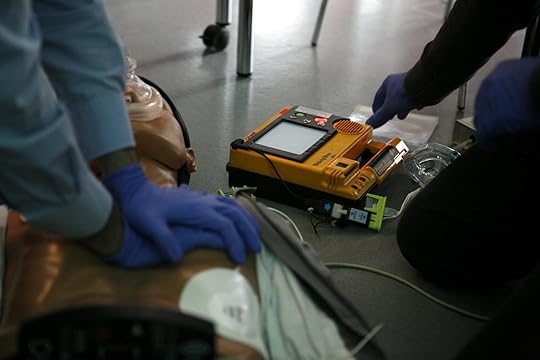 "CPR training-03" by Rama - Own work. Licensed under CC BY-SA 2.0 fr via Wikimedia Commons
"CPR training-03" by Rama - Own work. Licensed under CC BY-SA 2.0 fr via Wikimedia Commons
Cardiopulmonary Resuscitation is a key part of emergency first aid for a patient who's stopped breathing and has no pulse. Whether it's just the Basic Life Support (what non-medical people can be trained to do) or the Advanced Life Support (complete with ECG reading, IV drugs to give and the famous 4 H's and 4 T's), it's not surprising that it's featured a lot on media. It's pretty dramatic, and suspense sells, right?
Except on TV etc it's made as pleasant as possible. Whether it's the hero getting a chance to 'kiss' their lover who they haven't revealed their feelings to yet, or the extremely exaggerated success rate (up to 75% on TV, where in reality it's a lot lower, between 37-52% [source]).
CPR is also meant to be the definitive 'life saving' technique. And of course the patient can just get right back to whatever they were doing (we already established anaesthetists don't exist, so who needs ITU and post arrest support, eh?). Not to mention that survival to discharge rate in real life is as low as 11%...
7. One Dose Fits All/ Instant Sedation
(http://tvtropes.org/pmwiki/pmwiki.php/Main/InstantSedation)
 (source)
(source)
Whether it's an assassin planting poison or a princess trying to knock out her guards so she can escape to freedom, whatever dose of sedative or chemical they choose, it's equally effection on all parties and within the same time frame. Never mind size, weight, gender, liver capacity and genetic metabolic processes. If only real medicine was as easy as 'take two and call me in the morning'...
6. Radiograph of Doom
(http://tvtropes.org/pmwiki/pmwiki.php/Main/RadiographOfDoom)

So, we're in hospital, our character (with the Cough That Never Goes Away) has just had their first CT/ CAT scan...and the entire crowd of nurses, doctors, students and even the janitor can see it's clearly a T4N3M1 lung cancer.
Which in reality is a complete farce. While junior doctors and nurse practitioners are trained to read simple X-rays (as I've detailed in my post on medical imaging), and some subspecialties can interpret images directly (such as rheumatologists doing joint ultrasounds), more complex scans like ultrasound, CT and MRI need a radiologist's trained eye to find the subtle changes and give a formal report. Particularly staging scans, which look for spread of a tumour throughout the whole body (or in some cases where the primary tumour is, as a metastasis could have been picked up incidentally).
5. Blood From the Mouth (http://tvtropes.org/pmwiki/pmwiki.php/Main/BloodFromTheMouth)
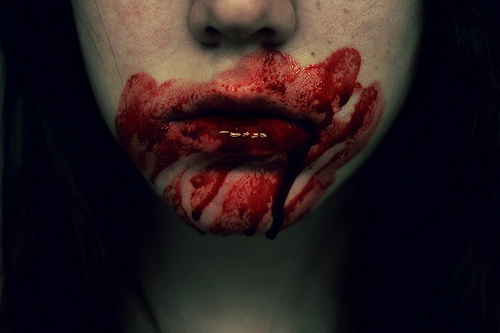 (source)
(source)
Bleeding from the upper oesophagus/ stomach/ small intestine is a very common medical problem...and one the media love to use for ANY penetrating wound to the chest/ abdomen. Got shot or stabbed? Gotta have that FRESH blood pouring from the lips, so the audience knows it's a bad wound. Even if the shot is in the abdomen or no way near the chest. Perhaps it's a spontaneous gum bleed triggered by the trauma.
4. Televisually Transmitted Disease
(http://tvtropes.org/pmwiki/pmwiki.php/Main/TelevisuallyTransmittedDisease)
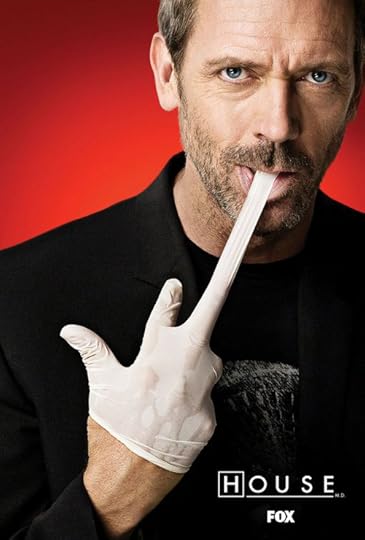 (source)
(source)
Let's be honest here; common things are common. As ridiculously obvious as this sounds, this also turns out to be pretty boring. I mean, who wants to watch about a COPD patient coming in with their eighth exacerbation this year, or the patient with lower back pain who just needs some extra pain killers? No no, that will not do!
So we end up seeing extremely rare conditions being diagnosed far more often than in real life. While this is (sort of, not really) acceptable in series like House which is all about rare diseases (or more often rare PRESENTATIONS of COMMON diseases), it gets really annoying seeing it all the time. That cough that's more than likely undiagnosed asthma just HAS to be cancer.
3. Worst Aid
(http://tvtropes.org/pmwiki/pmwiki.php/Main/WorstAid)
 (source)
(source)
Don't try this at home...no really, we mean it. These are the wild and wacky 'treatments' that seem to have no consequence when used in media. Just had a terrible car accident? Well let's just pull the victim out, and probably sever their spinal cord in the process. Got a sword through your arm? Just pull it out, you'll be fine, or more likely lose your entire blood supply in under a minute. Spent a few hours in a freezing river? A lovely hot bath will do...if you want to mess up your core temperature even more by causing redistribution of internal fluids.
There's no excuse, writers; do a little bit of research!
Check the link for plenty more examples!
2. Magical Defibrillation
(http://tvtropes.org/pmwiki/pmwiki.php/Main/MagicalDefibrillator)
 (source)
(source)
Oh no, that annoying 'beeeeeeeeeeeeeeeeeeeeeeeeeeeeeep' is sounding on the monitor, there's no electrical response from the patient's heart, therefore we must...NOT shock!
Despite what TV will tell you, asystole (whether the heart stops beating altogether) is a NON-SHOCKABLE RHYTHM! This needs treatment with IV medication ASAP, as does PEA (pulseness electrical activity, where you see the 'normal' ECG trace but the patient lacks a pulse, which is the COMMONEST of in-hospital cardiac arrest rhythms).
On the other hand, pulseless ventricular tachycardia (where the bottom chambers of the heart beat themselves into oblivion and can't push any blood out, hence no pulse) or ventricular fibrillation (where the heart just flutters) ARE shockable rhythms, and patients can respond very well to this.
Thankfully the AEDs available to the public do not give bystanders the option to interpret the heart rhythm, and give direct instructions on when to shock and when not to shock. Imagine the chaos if that wasn't the case!
1. Magic Antidote/ Instacure
(http://tvtropes.org/pmwiki/pmwiki.php/Main/MagicAntidote)
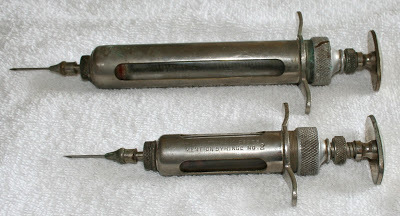 (source)
(source)
Human physiology is complex, and even more complex is the pharmacology that goes with it (how medicines interact with our bodies). Why else does Big Pharma spend so much money on research and trials? It's not easy to find that 'silver bullet' that will help attack the disease but leave the rest of the body unharmed.
But nope, not on TV or in film. We don't need to be hindered by things like antibiotic resistance, side effects or allergic reactions; a dose of whatever it is always works, and it doesn't matter how long the poison/ whatever was in your system, you'll be cured of all complications as well. You don't even need a course, just a one off dose will do.
So those are my hang-ups with medicine in the media! Does anything wind you up? Let me know!
However, since most writers are not medically trained, many tend to skip over research, and as such we have some well-embedded, if extremely false, tropes prevalent throughout our entertainment media. Most go unnoticed, but for doctors like me it can lead to a lot of eye rolling!
So here are the top 10 Medical Tropes that Wind Me Up (in no particular order):
10. The absent anaesthetist/ medical team
 (source)
(source)Whenever anyone needs some form of surgical intervention, the surgeon seems to also be the assistant, the anaesthetist, the scrub nurse and the operating department practitioner. The surgeon puts the patient under, does the job single handedly, and the result is always a miracle cure and speedy recovery, rather than the disastrous infection and bleeding rate and more than likely dead patient if this happened in the real world. No wonder surgeons used to think they were God...
9. Consultant Physician Surgeon Obstetric General Practitioner (http://tvtropes.org/pmwiki/pmwiki.php/Main/SurgeonsCanDoAutopsiesIfTheyWant)
 (source)
(source)Similar to the absent anaesthetist, this is the 'doctor/ healer' character who caters for the entirety of medicine and surgery. Broken bone? No problem. Childbirth? An expert. Ear ache? I can fix that. Need a hysterectomy? Sure! This one doctor has the specialist skills of twenty, she's your one-woman hospital, because come on, it's not like we have specialists for a reason. Your (fantasy) GP can sort it out.
8. Clean, Pretty, Reliable (CPR)
(http://tvtropes.org/pmwiki/pmwiki.php/Main/CPRCleanPrettyReliable)
 "CPR training-03" by Rama - Own work. Licensed under CC BY-SA 2.0 fr via Wikimedia Commons
"CPR training-03" by Rama - Own work. Licensed under CC BY-SA 2.0 fr via Wikimedia Commons
Cardiopulmonary Resuscitation is a key part of emergency first aid for a patient who's stopped breathing and has no pulse. Whether it's just the Basic Life Support (what non-medical people can be trained to do) or the Advanced Life Support (complete with ECG reading, IV drugs to give and the famous 4 H's and 4 T's), it's not surprising that it's featured a lot on media. It's pretty dramatic, and suspense sells, right?
Except on TV etc it's made as pleasant as possible. Whether it's the hero getting a chance to 'kiss' their lover who they haven't revealed their feelings to yet, or the extremely exaggerated success rate (up to 75% on TV, where in reality it's a lot lower, between 37-52% [source]).
CPR is also meant to be the definitive 'life saving' technique. And of course the patient can just get right back to whatever they were doing (we already established anaesthetists don't exist, so who needs ITU and post arrest support, eh?). Not to mention that survival to discharge rate in real life is as low as 11%...
7. One Dose Fits All/ Instant Sedation
(http://tvtropes.org/pmwiki/pmwiki.php/Main/InstantSedation)
 (source)
(source)Whether it's an assassin planting poison or a princess trying to knock out her guards so she can escape to freedom, whatever dose of sedative or chemical they choose, it's equally effection on all parties and within the same time frame. Never mind size, weight, gender, liver capacity and genetic metabolic processes. If only real medicine was as easy as 'take two and call me in the morning'...
6. Radiograph of Doom
(http://tvtropes.org/pmwiki/pmwiki.php/Main/RadiographOfDoom)

So, we're in hospital, our character (with the Cough That Never Goes Away) has just had their first CT/ CAT scan...and the entire crowd of nurses, doctors, students and even the janitor can see it's clearly a T4N3M1 lung cancer.
Which in reality is a complete farce. While junior doctors and nurse practitioners are trained to read simple X-rays (as I've detailed in my post on medical imaging), and some subspecialties can interpret images directly (such as rheumatologists doing joint ultrasounds), more complex scans like ultrasound, CT and MRI need a radiologist's trained eye to find the subtle changes and give a formal report. Particularly staging scans, which look for spread of a tumour throughout the whole body (or in some cases where the primary tumour is, as a metastasis could have been picked up incidentally).
5. Blood From the Mouth (http://tvtropes.org/pmwiki/pmwiki.php/Main/BloodFromTheMouth)
 (source)
(source)Bleeding from the upper oesophagus/ stomach/ small intestine is a very common medical problem...and one the media love to use for ANY penetrating wound to the chest/ abdomen. Got shot or stabbed? Gotta have that FRESH blood pouring from the lips, so the audience knows it's a bad wound. Even if the shot is in the abdomen or no way near the chest. Perhaps it's a spontaneous gum bleed triggered by the trauma.
4. Televisually Transmitted Disease
(http://tvtropes.org/pmwiki/pmwiki.php/Main/TelevisuallyTransmittedDisease)
 (source)
(source)Let's be honest here; common things are common. As ridiculously obvious as this sounds, this also turns out to be pretty boring. I mean, who wants to watch about a COPD patient coming in with their eighth exacerbation this year, or the patient with lower back pain who just needs some extra pain killers? No no, that will not do!
So we end up seeing extremely rare conditions being diagnosed far more often than in real life. While this is (sort of, not really) acceptable in series like House which is all about rare diseases (or more often rare PRESENTATIONS of COMMON diseases), it gets really annoying seeing it all the time. That cough that's more than likely undiagnosed asthma just HAS to be cancer.
3. Worst Aid
(http://tvtropes.org/pmwiki/pmwiki.php/Main/WorstAid)
 (source)
(source)Don't try this at home...no really, we mean it. These are the wild and wacky 'treatments' that seem to have no consequence when used in media. Just had a terrible car accident? Well let's just pull the victim out, and probably sever their spinal cord in the process. Got a sword through your arm? Just pull it out, you'll be fine, or more likely lose your entire blood supply in under a minute. Spent a few hours in a freezing river? A lovely hot bath will do...if you want to mess up your core temperature even more by causing redistribution of internal fluids.
There's no excuse, writers; do a little bit of research!
Check the link for plenty more examples!
2. Magical Defibrillation
(http://tvtropes.org/pmwiki/pmwiki.php/Main/MagicalDefibrillator)
 (source)
(source)Oh no, that annoying 'beeeeeeeeeeeeeeeeeeeeeeeeeeeeeep' is sounding on the monitor, there's no electrical response from the patient's heart, therefore we must...NOT shock!
Despite what TV will tell you, asystole (whether the heart stops beating altogether) is a NON-SHOCKABLE RHYTHM! This needs treatment with IV medication ASAP, as does PEA (pulseness electrical activity, where you see the 'normal' ECG trace but the patient lacks a pulse, which is the COMMONEST of in-hospital cardiac arrest rhythms).
On the other hand, pulseless ventricular tachycardia (where the bottom chambers of the heart beat themselves into oblivion and can't push any blood out, hence no pulse) or ventricular fibrillation (where the heart just flutters) ARE shockable rhythms, and patients can respond very well to this.
Thankfully the AEDs available to the public do not give bystanders the option to interpret the heart rhythm, and give direct instructions on when to shock and when not to shock. Imagine the chaos if that wasn't the case!
1. Magic Antidote/ Instacure
(http://tvtropes.org/pmwiki/pmwiki.php/Main/MagicAntidote)
 (source)
(source)Human physiology is complex, and even more complex is the pharmacology that goes with it (how medicines interact with our bodies). Why else does Big Pharma spend so much money on research and trials? It's not easy to find that 'silver bullet' that will help attack the disease but leave the rest of the body unharmed.
But nope, not on TV or in film. We don't need to be hindered by things like antibiotic resistance, side effects or allergic reactions; a dose of whatever it is always works, and it doesn't matter how long the poison/ whatever was in your system, you'll be cured of all complications as well. You don't even need a course, just a one off dose will do.
So those are my hang-ups with medicine in the media! Does anything wind you up? Let me know!
Published on August 07, 2015 13:04
July 11, 2015
Guest post-- A.F.E Smith Darkhaven Release Tour
Finally, a weekend off for me (anyone who's ever worked an A+E rota will tell you how painful it is...)
And what better way to enjoy this hard-earned rest than to host A.F.E Smith, author of the newly-released Darkhaven, published by Harper Voyager! Plus there's even a giveaway for you to enter to win a copy of said book, too...
Rafflecopter giveaway
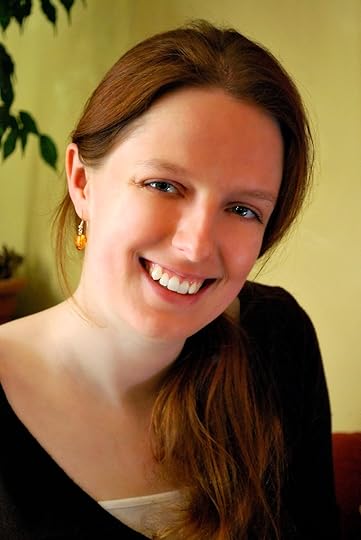
A.F.E. Smith is an editor of academic texts by day and a fantasy writer by night. So far, she hasn’t mixed up the two. She lives with her husband and their two young children in a house that someone built to be as creaky as possible – getting to bed without waking the baby is like crossing a nightingale floor. Though she doesn’t have much spare time, she makes space for reading, mainly by not getting enough sleep (she’s powered by chocolate). Her physical bookshelves were stacked two deep long ago, so now she’s busy filling up her e-reader.
What A.F.E. stands for is a closely guarded secret, but you might get it out of her if you offer her enough snacks.
So, as A.F.E has toured the exotic locales of the interwebs, her stop with me will tell us more about her as a writer, and what Darkhaven is all about.
My writing life
This may be the last day of my blog tour, but it occurred to me (belatedly) that I should introduce myself as a writer. Yes, this post should have gone at the very beginning, but what can I say? Read through the set of tour posts backwards and it may all make sense :-)
So without further ado, here I am, answering some fundamental questions about my writing life.
What do you write?
Fantasy. Usually with death, destruction and darkness in it, but also a bit of romance and other soppy things. Because I’m contradictory that way.
Who is it for?
Adults, officially. I dunno. I’d have read the sort of stuff I write when I was eleven or twelve, but I’m not sure if I’m actually meant to recommend it to that age group, given the occasional bouts of sex, swearwords and bloody violence.
Why do you write?
I write because I have always written. That isn’t an exaggeration. I’ve wanted to be an author since I was six years old and wrote my first ‘book’. I keep coming back to it because if I don’t, it makes me grumpy.
Less flippantly, I write because I have always read. And because books have always been my greatest source of entertainment and solace, I would like nothing more than to provide the same for other people.
When do you write?
Around the edges. In my lunch break, during my children’s nap times, after everyone else has gone to bed. But of course there’s also lots of time when I’m not actually writing, but thinking about writing – which can be just as useful. I often plot things out in my head when I’m doing some tedious task and my mind is free to wander. So I write-without-writing when I’m walking to work. In the shower. Chopping vegetables. In a boring meeting … er, better scratch that last one.
Where do you write?
I would love an actual dedicated writing space. A little table, a couple of bookcases, a pinboard for all my reference notes and illustrations … But the truth is, I write wherever I find a space. At the dining table. On the sofa. In bed.
How do you write?
By typing the words into a computer ;-)
Of course, this may be a deeper question than I’m giving it credit for, and it’s really about how to go about the process of writing. In which case, the best writing advice I can offer is simply to write. Keep writing and never look back, as if you are Orpheus and every word you put on the page takes you one step further out of the underworld.
I’m terrible for this, myself. I have a tendency to want to polish as I go along. And then the flow stops and I end up with one perfectly crafted, lifeless paragraph instead of a fluid page of action.
The only way I can get round it is to force myself not to read back over what I’ve written. Just keep going. If there are joining sentences or less interesting events for which I don’t immediately have the words, skip over them and keep going.
And yes, when I read back over it there’ll be word repetition all over the place, and sentences that don’t make sense, and comments in square brackets that say things like “he crosses the room” or “she fights off three men”. And little notes reminding me to cross-check Chapter X with Chapter Y, because I’m writing it as it comes and that isn’t necessarily chronologically, and the bits don’t necessarily join up yet. It’s a mess. Yet it has a shape and a feel to it that it wouldn’t have had if I’d done it one perfect paragraph at a time.
It’s like that thing about sculpting, how you gradually take away a bit at a time from a block of wood until its true essence is revealed. Rather than take away all the bits around the hand until you have a perfect hand sticking out of the shapeless block that is the rest of the wood, you chip away at the whole thing, but in stages. Rough outline of a figure. More detailed outline of a figure. Until finally you end up with The Thinker, and everyone admires your artistic skill for the rest of eternity.
Well. One can only hope.
I'm sure everyone will appreciate your efforts, A.F.E. Now then, let's take a look at Darkhaven:
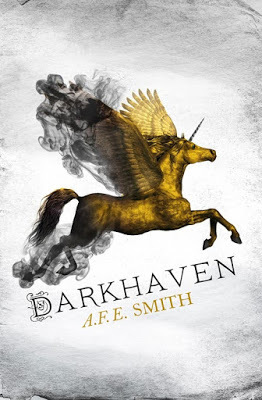
Genre: Fantasy
Publisher: Harper Voyager
Release date: 2 July 2015 (ebook), 14 January 2016 (paperback)
Price: £1.99/$3.99 (ebook)
Ayla Nightshade never wanted to rule Darkhaven. But her half-brother Myrren – true heir to the throne – hasn’t inherited their family gift, forcing her to take his place.
When this gift leads to Ayla being accused of killing her father, Myrren is the only one to believe her innocent. Does something more sinister than the power to shapeshift lie at the heart of the Nightshade family line?
Now on the run, Ayla must fight to clear her name if she is ever to wear the crown she never wanted and be allowed to return to the home she has always loved.
Buy links
HarperCollins
Amazon (global link)
Barnes & Noble
Google play
iBooks
Kobo
Follow A.F.E. Smith on:
WebsiteFacebookTwitterGoodreads
And what better way to enjoy this hard-earned rest than to host A.F.E Smith, author of the newly-released Darkhaven, published by Harper Voyager! Plus there's even a giveaway for you to enter to win a copy of said book, too...
Rafflecopter giveaway

A.F.E. Smith is an editor of academic texts by day and a fantasy writer by night. So far, she hasn’t mixed up the two. She lives with her husband and their two young children in a house that someone built to be as creaky as possible – getting to bed without waking the baby is like crossing a nightingale floor. Though she doesn’t have much spare time, she makes space for reading, mainly by not getting enough sleep (she’s powered by chocolate). Her physical bookshelves were stacked two deep long ago, so now she’s busy filling up her e-reader.
What A.F.E. stands for is a closely guarded secret, but you might get it out of her if you offer her enough snacks.
So, as A.F.E has toured the exotic locales of the interwebs, her stop with me will tell us more about her as a writer, and what Darkhaven is all about.
My writing life
This may be the last day of my blog tour, but it occurred to me (belatedly) that I should introduce myself as a writer. Yes, this post should have gone at the very beginning, but what can I say? Read through the set of tour posts backwards and it may all make sense :-)
So without further ado, here I am, answering some fundamental questions about my writing life.
What do you write?
Fantasy. Usually with death, destruction and darkness in it, but also a bit of romance and other soppy things. Because I’m contradictory that way.
Who is it for?
Adults, officially. I dunno. I’d have read the sort of stuff I write when I was eleven or twelve, but I’m not sure if I’m actually meant to recommend it to that age group, given the occasional bouts of sex, swearwords and bloody violence.
Why do you write?
I write because I have always written. That isn’t an exaggeration. I’ve wanted to be an author since I was six years old and wrote my first ‘book’. I keep coming back to it because if I don’t, it makes me grumpy.
Less flippantly, I write because I have always read. And because books have always been my greatest source of entertainment and solace, I would like nothing more than to provide the same for other people.
When do you write?
Around the edges. In my lunch break, during my children’s nap times, after everyone else has gone to bed. But of course there’s also lots of time when I’m not actually writing, but thinking about writing – which can be just as useful. I often plot things out in my head when I’m doing some tedious task and my mind is free to wander. So I write-without-writing when I’m walking to work. In the shower. Chopping vegetables. In a boring meeting … er, better scratch that last one.
Where do you write?
I would love an actual dedicated writing space. A little table, a couple of bookcases, a pinboard for all my reference notes and illustrations … But the truth is, I write wherever I find a space. At the dining table. On the sofa. In bed.
How do you write?
By typing the words into a computer ;-)
Of course, this may be a deeper question than I’m giving it credit for, and it’s really about how to go about the process of writing. In which case, the best writing advice I can offer is simply to write. Keep writing and never look back, as if you are Orpheus and every word you put on the page takes you one step further out of the underworld.
I’m terrible for this, myself. I have a tendency to want to polish as I go along. And then the flow stops and I end up with one perfectly crafted, lifeless paragraph instead of a fluid page of action.
The only way I can get round it is to force myself not to read back over what I’ve written. Just keep going. If there are joining sentences or less interesting events for which I don’t immediately have the words, skip over them and keep going.
And yes, when I read back over it there’ll be word repetition all over the place, and sentences that don’t make sense, and comments in square brackets that say things like “he crosses the room” or “she fights off three men”. And little notes reminding me to cross-check Chapter X with Chapter Y, because I’m writing it as it comes and that isn’t necessarily chronologically, and the bits don’t necessarily join up yet. It’s a mess. Yet it has a shape and a feel to it that it wouldn’t have had if I’d done it one perfect paragraph at a time.
It’s like that thing about sculpting, how you gradually take away a bit at a time from a block of wood until its true essence is revealed. Rather than take away all the bits around the hand until you have a perfect hand sticking out of the shapeless block that is the rest of the wood, you chip away at the whole thing, but in stages. Rough outline of a figure. More detailed outline of a figure. Until finally you end up with The Thinker, and everyone admires your artistic skill for the rest of eternity.
Well. One can only hope.
I'm sure everyone will appreciate your efforts, A.F.E. Now then, let's take a look at Darkhaven:

Genre: Fantasy
Publisher: Harper Voyager
Release date: 2 July 2015 (ebook), 14 January 2016 (paperback)
Price: £1.99/$3.99 (ebook)
Ayla Nightshade never wanted to rule Darkhaven. But her half-brother Myrren – true heir to the throne – hasn’t inherited their family gift, forcing her to take his place.
When this gift leads to Ayla being accused of killing her father, Myrren is the only one to believe her innocent. Does something more sinister than the power to shapeshift lie at the heart of the Nightshade family line?
Now on the run, Ayla must fight to clear her name if she is ever to wear the crown she never wanted and be allowed to return to the home she has always loved.
Buy links
HarperCollins
Amazon (global link)
Barnes & Noble
Google play
iBooks
Kobo
Follow A.F.E. Smith on:
WebsiteFacebookTwitterGoodreads
Published on July 11, 2015 01:00
July 9, 2015
Well-Written Characters (Part 4)
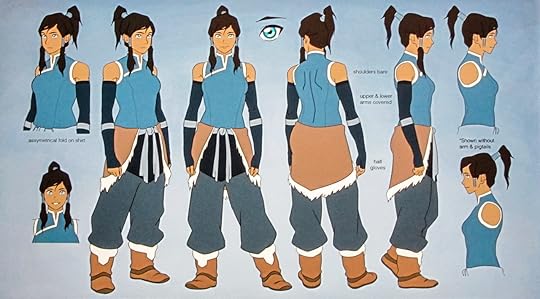 (Character sheet for Avatar Korra, from Legend of Korra, source)
(Character sheet for Avatar Korra, from Legend of Korra, source)As both a consumer of various entertainment media and a writer, characters are one of the key factors that decide if I end up liking a franchise or not, and that's probably true for many people. As shown by my One Hundred Character Meme, I enjoy a variety of different characters.
However, what I like even more is a well-written character . What defines what this is will be different for different people, but it got me thinking: what makes ME consider a character well-written? How can I adore one character in one series and yet dislike a very similar character in another? And better still, how can this help me make sure the characters I create are similarly written?
So, in this four-part series, I'm going to apply some simple criteria to several examples from books, video game, TV and film, and see if they fit or fail the Sam's Well-Written Character Test (TM).
Please remember this is a completely subjective set of criteria and it's simply my personal opinion, nothing more!
My deciding criteria consists of:
Personality - how is the character presented, what traits define them, how easy is it to identify the character, do they stand out compared to others?
Flaws/ Roundedness - what are the character's flaws? How do these interfere with/ hinder the character? Do they make the character feel more real?
Relatability - how relatable is the character? Can we empathize/ sympathize with them?
Consistency - is the character written consistently? Do they have any out-of-character moments, and if so are these plot-drive or convenience driven?
Development - does the character have an arc, do they learn anything/ change as a result (for better or worse)?
Each one will be marked out of 5, and the standard to qualify for well-written for me will be 15/25 (60%) (average 3/5 for all criteria). Not an easy one to please, am I?
View Part One here.
Part Two here.
Part Three here.
So let's see how our chosen ones will fare in our final medium, FILMS !
Jasminder 'Jas' Kaur (Bend It Like Beckham)

Personality: 4/5
Jas is the very talented, if somewhat shy, main star of the film. Her one true love is football (soccer), and she's pretty good at it, too. However she's pulled into conflict with her traditional Sikh roots, where her parents do not appreciate her talent and try to make her conform to their traditional standards. Jas shows great determination and courage, yet at the same time she's always questioning and second-guessing herself, so she provides a great rounded mix of personal traits.
Flaws/ Roundedness: 4/5
Jas' main flaws come from her indecisiveness and her wanting to please everyone all the time, rather than make choices for herself. She's really torn between wanting to take a chance and follow her dream versus making her parents happy by being 'bored out of her mind as a solicitor'. She's also pretty shy and underconfident (which I find adorable!).
Relatability: 5/5
For me Jas is extremely relatable, as while I'm not Sikh (I'm Hindu) the cultural boundaries are pretty much the same. Families of Indian background tend to value stable, professional jobs rather than creative, artistic ones and there is a lot of extended familial 'gossip' for even the most trivial things. Poor Jas is punished for being talented at something seen as 'worthless' (as there's no financial stability) and this puts her at odds with her parents, family and culture. Also, her lack of awareness as to the 'gossip' mentality of close family/ friends lands her into trouble, which has happened to me on occasion when I was younger (thankfully I am much wiser now!).
Consistency: 3/5
Jas is pretty consistent, well, as consistent as one can be when they're in such inner conflict. She'll lie to her parents to go play for her local women's football team, and then in the next breath be so crushed with guilt that she'll talk herself out of every playing again. The only time she doesn't quite act like usual are when she's slightly drunk at the club and has a brief intimate moment with her coach, despite knowing that her best friend also has a crush on him.
Development: 4/5
Jas does have a wonderful arc where she comes to reconcile her two conflicting desires and makes peace with her parents and her life choices. She finally decides what she wants for herself and does it in a way of compromise with her parents, rather than defiance, and this finally leads to their acceptance. She also makes amends with her best friend, and her sister, and learns that she can value her roots and culture while at the same time also embark on her dream career.
Total: 20/25 (80%)
Good pass! (forgive the pun!)
Rapunzel (Tangled)
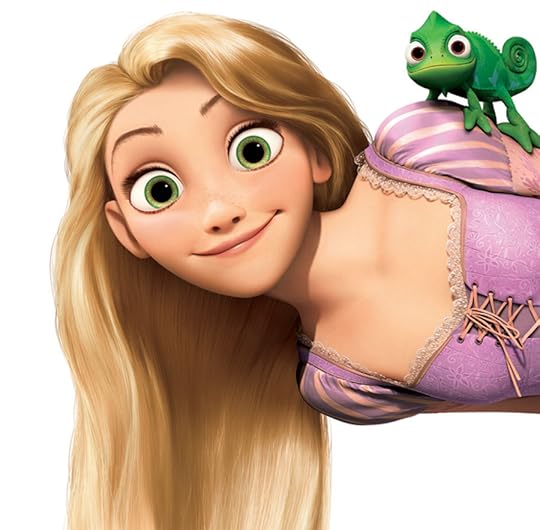
Personality: 3/5
Rapunzel is a feisty, free-spirited princess (although she's unaware of the latter for most of the film). She's creative and artistic, has a passionate imagination and like your typical teen wants to prove she can survive outside on her own, as well as find the truth about her past. While she may be afraid and unwilling at first, once she finds the courage to leave home against her 'mother's' wishes, she proves to be determined and proactive in her endeavors.
Flaws/ Roundedness: 3/5
Rapunzel's flaws come from her naivety and gullibility. Given her lack of worldly experience she is prone to being easily manipulated, and also her impulsive nature can lead her to make unwise choices. Her fear of Mother Gothel too undermines her confidence and independence; things she eventually learns to overcome.
Relatability: 4/5
Rapunzel is pretty appealing to most, with everyone able to identify with the 'finding yourself' adolescent themes and her quirky determination; a significant departure from the usual passive and tame Disney Princesses of old. We can easily empathise with her situation and desperation to learn about the lanterns, and I enjoyed following her journey.
Consistency: 4/5
Rapunzel can fluctuate between fierce and independent to lukewarm and regretful (as shown in this brillant GIF set), depending on her feelings at the time. However this tends to be plot related, and there wasn't a moment I recall where she acted way out of character, so she's generally consistent.
Development: 3/5
The development Rapunzel follows is generally well done (if somewhat predictable). She learns to trust herself and her skills, stands up to Mother Gothel who has smothered her entire life, and even experiences loss (even if it is short-lived). She's not as naive as before, but still retains her sense of self, so ends up more rounded.
Total: 17/25 (68%)
Rapunzel makes the cut too!
Carl Fredricksen (Up!)
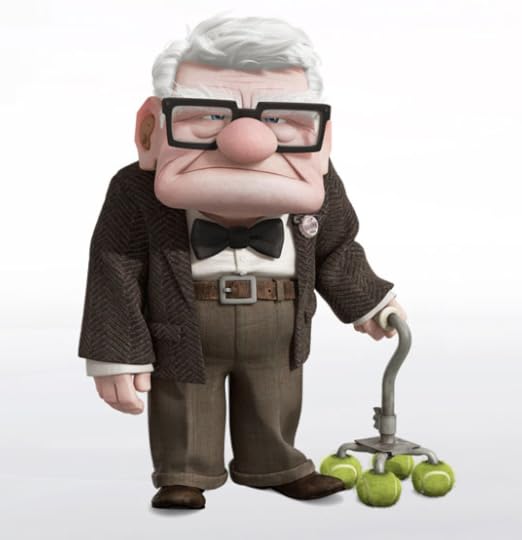
Personality: 4/5
Carl is the curmudgeonly grumpy old man who finally embarks on his own adventure after the passing of his dear wife. He's very shut in, resentful and just wants to be left alone, believing the world has nothing left to offer him as it took the woman he loved away. He's certainly not meant to be likeable, which makes him stand out to other main characters, but of course he has reasons to be the way he is...
Flaws/ Roundedness: 5/5
Carl's main flaws stem from him isolating himself. He's very antisocial, quite short-tempered and really wants to sever all ties to anything he could care about. Given what we learn about his life, this is all too understandable, and cement him as a solid character.
Relatability: 3/5
Even though an elderly gentleman may not be the most relatable to children, the way Carl is portrayed gives him clear motivations and backstory, which anyone of any age can appreciate. We also share his shock when he discovers the truth about his childhood hero, and root for him to win.
Consistency: 4/5
Carl is consistent for his development. The choices and decisions he makes fit with his personality and mindset of each moment, and he doesn't step much out of it.
Development: 4/5
Carl's development is strong. Even though he's loved and lost and thinks there is nothing left for him, he is able to rediscover himself, find a new companion in the form of his boy scout 'grandson', and go on and enjoy the adventure he always dreams of. He also comes to appreciate the time he spent with his wife, and lets go of his regret that he could never take her to their adventure spot.
Total: 20/25 (80%)
Well, was there ever any doubt?
And there it is; all characters pass my test! Not bad, eh?
What do you look for in a well-written character, and who do you consider well-written? Tell me!
Don't forget to check Part One: Books!
And Part Two: Games!
Not forgetting Part Three: Animation/ TV!
Published on July 09, 2015 14:29
May 31, 2015
The Binding- free until 05/06/2015!
Published on May 31, 2015 14:03

